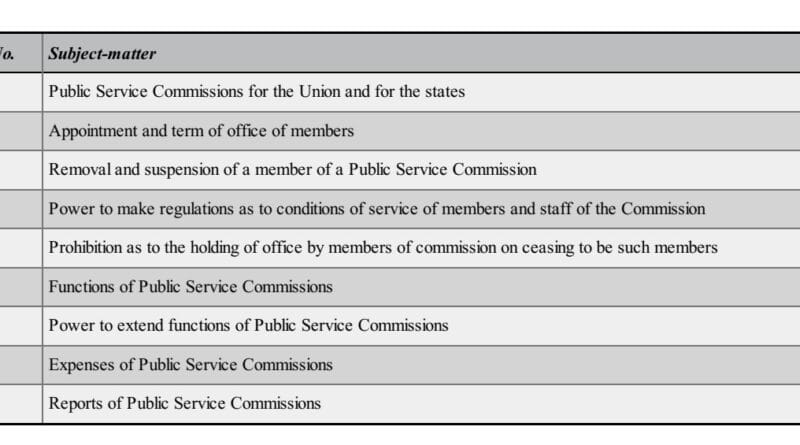UPSC- Union Public Service Commission
UPSC – A Constitutional Body
Contents
Constitutional Foundation of UPSC
UPSC is an independent constitutional body created directly by the Indian Constitution under Articles 315-323 in Part XIV.
Article 315: Mandates establishment of Public Service Commission for the Union and for each State.
Article 316: Governs appointment and term of office of members – 6 years or age 65, whichever is earlier.
Article 317: Provides removal and suspension procedures for members.
Article 318: Empowers regulation-making for service conditions of members and staff.
Article 319: Prohibits post-retirement employment for members in government.
Article 320: Details comprehensive functions of Public Service Commissions.
Article 321: Grants Parliament power to extend UPSC functions.
Article 322: Ensures expenses charged on Consolidated Fund of India.
Article 323: Mandates annual reports to President and Parliament.
Evolution of UPSC from British Era
Colonial Origins (1919-1926)
Government of India Act 1919: Section 96(C) provided for establishment of Public Service Commission in India.
Lee Commission (1924): Royal Commission under Lord Lee of Fareham recommended immediate establishment of Public Service Commission.
Lee Commission Recommendations:
40% British, 40% directly recruited Indians, 20% promoted from provincial services
Establishment of Public Service Commission as “cardinal feature”
Achieve 50:50 parity between Europeans and Indians in 15 years
Establishment and Evolution
October 1, 1926: First Public Service Commission established under Sir Ross Barker as Chairman with 4 members.
Government of India Act 1935: Created Federal Public Service Commission and Provincial Public Service Commissions.
January 26, 1950: Federal Public Service Commission became Union Public Service Commission with constitutional status.
Composition and Structure of UPSC
Membership
Chairman + Members: Usually 9-11 members including Chairman appointed by President of India.
No Fixed Strength: Constitution leaves composition to President’s discretion.
Qualification: Half the members must have 10 years’ experience under Government of India or State government.
Term: 6 years or until age 65, whichever is earlier.
Appointment Process
Presidential Appointment: President determines composition, conditions of service.
Acting Chairman: President can appoint acting chairman when office falls vacant or chairman unable to perform duties.
Service Conditions: Determined by President but cannot be varied disadvantageously after appointment.
Independence Safeguards
Security of Tenure
Protected Removal: Members removable only on constitutional grounds and manner.
Supreme Court Inquiry: For misbehavior cases, mandatory Supreme Court inquiry before removal.
Defined Misbehavior: Interest in government contracts or deriving profit from such contracts.
Financial Independence
Consolidated Fund: All expenses including salaries, allowances, pensions charged on Consolidated Fund of India.
Non-Votable: Expenses not subject to Parliamentary vote.
Post-Service Restrictions
Chairman: Not eligible for further government employment after ceasing office.
Members: Eligible only for UPSC Chairmanship or SPSC positions, not other government employment.
No Reappointment: Not eligible for second term in same office.
Functions and Powers of UPSC
Examination and Recruitment Functions
Conducts examinations for All-India Services, Central Services, and centrally administered territories.
Assists states in joint recruitment schemes when requested by two or more states.
Serves state needs on Governor’s request with Presidential approval.
Advisory Functions
Recruitment Methods: Advises on methods for civil services recruitment.
Appointment Principles: Guides principles for appointments, promotions, transfers.
Candidate Suitability: Assesses suitability for appointments and promotions.
Disciplinary Matters: Handles all disciplinary matters including:
Censure and withholding increments
Reduction in rank (demotion)
Compulsory retirement, removal, dismissal
Additional Consultative Roles
Legal Expense Reimbursement: Claims for legal expenses in official duty-related proceedings.
Pension Awards: Injury-related pension claims and amounts.
Temporary Appointments: Matters exceeding one year and regularization.
Extension of Service: Grant of extension and re-employment of retired civil servants.
Working Functions and Role
Core Responsibilities
Merit System Guardian: Constitution visualizes UPSC as “watchdog of merit system” in India.
Central Recruiting Agency: Primary recruitment body for Group A and Group B Central Services.
Advisory Nature: Recommendations are advisory, not binding on government.
Reporting Mechanism
Annual Reports: Presents annual performance report to President.
Parliamentary Presentation: President places report before both Houses of Parliament.
Non-Acceptance Memorandum: Cases where UPSC advice not accepted must be explained with reasons.
Cabinet Committee Approval: Non-acceptance requires Appointments Committee of Union Cabinet approval.
Limitations and Scope
Excluded Matters
Reservation Appointments: Not consulted for backward class reservations.
SC/ST Appointments: Claims consideration kept outside UPSC purview.
High-Level Appointments: Commission/tribunal chairmanships, diplomatic posts, Group C/D services.
Temporary Posts: Appointments likely to be held for less than one year.
Regulatory Powers
Presidential Regulations: President can exclude posts/services from UPSC purview.
Parliamentary Oversight: Regulations must be laid before Parliament for 14 days.
Parliamentary Amendment: Parliament can amend or repeal Presidential regulations.
Contemporary Challenges and Evolution
Institutional Relationships
Central Vigilance Commission: CVC creation (1964) affected UPSC’s disciplinary role.
Conflicting Advice: Problems arise when UPSC and CVC tender conflicting advice.
Constitutional Edge: UPSC as constitutional body has edge over executive-created CVC.
Administrative Division
Department of Personnel and Training: Handles classification, pay, service conditions, cadre management, training.
Functional Separation: UPSC focuses on recruitment while DoPT manages personnel administration.
Limited Role: UPSC role limited compared to broader personnel management functions.
Modern Relevance
Centenary Milestone: Completing 100 years of institutional journey (1926-2026).
Democratic Foundation: Serves as bedrock of India’s bureaucratic framework.
Merit and Integrity: Symbolizes impartiality, integrity, and meritocracy in public life.
Administrative Leadership: Shapes India’s administrative leadership for governance challenges.
Discover more from Simplified UPSC
Subscribe to get the latest posts sent to your email.




